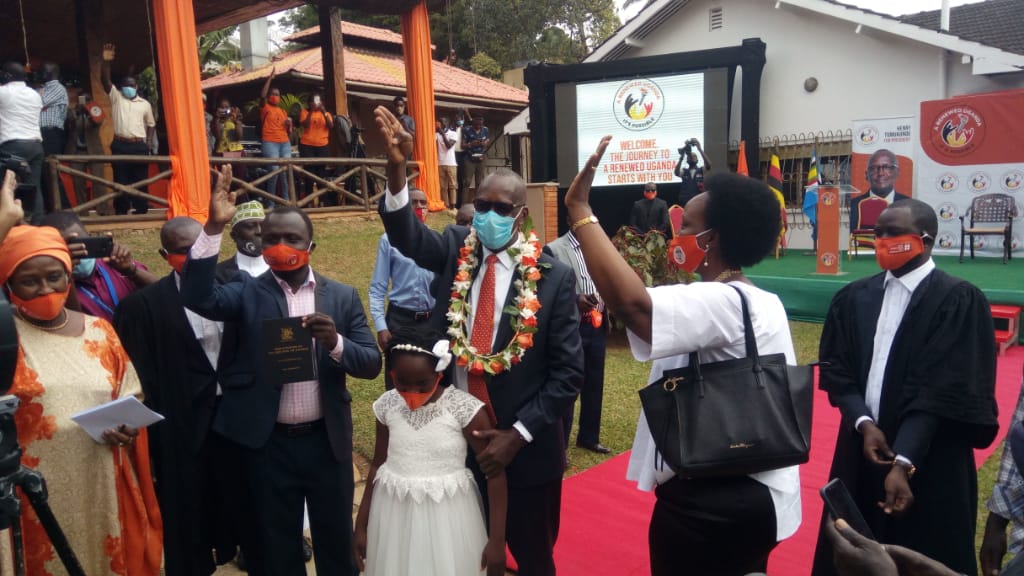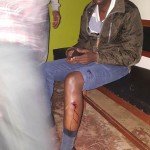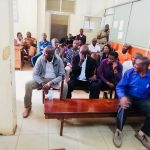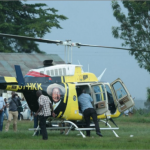Former Security Minister General Henry Tumukunde has declared that he will stand on an independent ticket come 2021 general elections.
While officially launching his political ambitions at his campaign Headquarter office in Kololo, he said that standing on an independent ticket will help him serve Ugandans well without being held back by political parties.
During this launch, Tumukunde notes that he disagrees with people who say that this government has done nothing, adding that something has been done but a lot needs to be done especially for poor and underprivileged Ugandans.
“This government has failed to communicate to the masses who are the majority but most vulnerable,” Notes Gen Tumukunde.
The launch has been attended by various people from different regions, most of whom are the aspiring candidates of different positions who are going to be standing as Renewed Uganda members under the slogan, ‘it is possible’.
According to Tumukunde, he will be focusing on issues like eradicating poor housing among Ugandans, citing that there are Ugandans who are still sleeping in grass thatched houses, investing in renewable energy, addressing issues of money in the country, introduction of technical education by amending the curriculum among others.
Addressing the audience, he explains how youths being the majority Ugandans have been left out yet they need a hand by the government for them to develop.
Lapson Kijambu a resident of Kisenyi 2 who represented low class Ugandans expresses his excitement that Tumukunde saved them from Bijambiya and boda boda groups that were terrorizing Ugandans when he was a minister of security.
Charles Ndugwa the chairperson of boda boda riders in Uganda under their umbrella Alliance of boda boda association which brings all the boda riders together narrates how they have decided to join general Tumukunde as the person who will understand them.
Ndugwa notes that the government has forsaken boda boda riders especially in this period of Covid – 19 pandemic.
Judith Enyang the aspiring woman member of Parliament Kwania district explains that she has made up her mind to be part of general Tumukunde’s Renewed Uganda because he is a tested, proved and finished product that will make a good president come 2021.
General Tumukunde appealed to Ugandans to come and join Renewed Uganda for a clear transformation and transition of leadership.
He further noted how he doesn’t support people who are involved in fights. Adding that they shall get down and reach people for votes, not fighting on streets.
General Tumukunde, also served as the UPDF chief of personal and administration, chief of military intelligence as well as serving as the commanding officer of the UPDF Four Division, based in Gulu in the northern Region of Uganda.
He has also previously served as the director general of the internal security Organization(ISO). Tumukunde was also a member of parliament representing the Army in the Parliament of Uganda between 1995 and 2005.
Below is the full speech;
First and foremost, I wish to thank God for bringing us this far. I thank Him for giving us an opportunity to witness the changes in our country, and for the opportunity to make a contribution in our respective capacities and capabilities.
More than ever before, in post-independence Uganda, a moment has come, that requires us, to mobilise ourselves into a collective force to shape the future and destiny of our nation. The need to address the issue of a peaceful transition cannot be overemphasised. A transition, not in the narrow interpretation of changing leadership from the incumbent to another person, but a bigger agenda that will enable Ugandans to migrate from the traditional partisan discourse of fixed positions to one of enhanced political inclusiveness, a transition from a nature-based, to a modern, industrial, knowledge-based economy, with equitable access to resources and opportunities.
I wish to appreciate the opposition political parties and groupings which have raised their voices against the sins and crimes that have and continue to be committed in this country by those who hold the responsibility to protect the rights of citizens. Voices against failure to effectively develop the economy, to ensure that we have a healthy population and to promote equitability between all the geographical regions, and the different sections of our population.
I have personally engaged with the various political players and will continue to do that so that we find a mechanism of collaboration through which we can collectively tackle the challenges of governance of this country. Without addressing the governance question, my team and I are convinced that little, if any, will change. Albert Einstein is widely credited for having warned against “doing the same thing over and over again, but expecting different results”.
Uganda, as we all know, has not had a successful multiparty democracy. Political Parties, ruling and opposition, have had limited opportunity to contribute positively to the process of governance. They remain weak, lack institutional support, and have deliberately been denied a role in the transition to effective democratic politics. For the opposition parties, restrictions are imposed on free participation, as political dissent is criminalised in an attempt to maintain a monopoly of influence. The electoral processes are severely undermined by incidences of extreme violence, vote-rigging and the obscene use of money.
My friends in NRM know the truth, that the political space is getting narrower and narrower, and that to survive one how to tow the line, however dangerous. To the extent that people can stake their own political future, jeopardise the interests of their electorate, but also their own beliefs. Our Constitution which participated in the making has been abused, over and over, unfortunately by those who should protect it. I am on the record for having opposed the move to amend the Constitution to remove term limits, for which I was arrested, detained and charged. What I was advocating for was for us to keep the promises we made to Ugandans in 1986 when we took power. Because the journey to democratise and develop this country seems to be like a ship that is sinking. We have to design a new path, to reboot the system, reengineer and renew the country.
On March 3rd this year, guided by the provisions of the Presidential Elections Act 2005, I wrote to the Electoral Commission expressing my interest to carry out countrywide consultations, as an intending Presidential candidate. A week later, on 10th March, I again wrote and delivered a letter to the Inspector General of Police, notifying him of my intentions, citing the Public Order Management Act, which in Part II Section 3 gives the IGP power to regulate the conduct of all public meetings. It was gratifying to see that this move caused a lot of excitement among a big section of the population. Unfortunately, in equal measure or even more, it causes a lot of anxiety and panic in others. The rest is history, and here we are, back on drawing board, but in a complex environment where we are forced to join a “scientific” political exercise, whose shape and form has not been clearly defined. We shall, in the best way that we can, try to comply with the health regulations, without compromising our intentions.
The platform upon which my colleagues and I will be conducting our nationwide campaign still aims to consult different categories of Ugandans on what concerns them most, so that their views contribute to our manifesto, already under construction. We will be targeting different sections of the population, in government, in Private sector as well as civil society. Youth and women will be given particular attention because their concerns vary depending on the category. For example, when we talk of women, who do we exactly mean? We have women in agriculture, in trade, in public service, in the service industry, corporates, women in politics, mothers, some of the single, and so on.
The youth represent 78% of the population, but an estimated 70% of them are unemployed. And yet, about 700,000 young people reach working age, but only 75,000 jobs are created per year. 400,000 young people are released from universities and other tertiary institutions to the job market annually. The education system, especially the curriculum, for secondary/tertiary institutions, therefore, does not address the needs of the job market. Parents are paying $100m annually to join the government is investing in a product that we don’t consume!!!!
How then, are we positioning the country for the 4th Industrial revolution of digitalisation, automation and robotics, artificial intelligence and 3D printing?
When it comes to the economy, with Uganda’s high population growth rate (3.7%) against economic growth rate which was 5.8% before COVID and now 1.8%, Uganda will fall into recession if something is not done expeditiously. A post-COVID recovery plan is key.
The present policies cannot address the high poverty incidence, especially in rural areas (22.8%) where more than 70% of Ugandans live, employed in agriculture, mainly on a subsistence basis. We should aim at efficient ways of subsidising the agricultural sector, on which industrialisation lies. Uganda will not industrialise if we don’t address the agriculture sector, address the marketing side, and stabilise prices. In the 60s, agriculture used to contribute 54% of GDP. Today, and now it contributes about 21%, other services 54%. What happened?
Agriculture has remained basically small-scale, with farmers lacking the resources to improve productivity, affected by weather shocks and climate change, no water for irrigation, poor advisory services; low investment in agro-technologies to increase production; lack of policy on preservation and better utilization of food.
When other countries are investing in technology and Innovation for agriculture, Uganda is still talking about increasing the supply of hoes!!!!
We are concerned about the glaring geographical inequality with poverty levels remaining highest in the northern and northeastern parts of the country. In this 21st century. How can 90% of households in Northern Uganda live in grass-thatched houses?
We have to address fiscal indiscipline, demonstrated by the perennial borrowing, inability to support our budget, and huge domestic borrowing crowding out the private sector. A substantial part of domestic debt is through the issuance of treasury bills and bonds, and yet most are for monetary and not fiscal purposes. Money that is extracted from the economy, put in BOU to collect interest, instead of making it more useful in the economy.
The current regressive tax regime is unfair and exploitative, favouring foreign investors, who invest in industries that do not add value to our raw material. Tax exemptions applied on a discretionary basis, promoting corruption and undermining revenue collection for the delivery of public services. VAT is applied at a blanket rate of 18 per cent, hitting the poorest hardest.
I will not end my speech without talking briefly about the cost of public administration. There is an obvious politically motivated creation of weak and ineffective administrative units, which is weighing heavily on the economy. As a country, can we sustain this? With the salary of a presidential adviser being equivalent to the salary of 10+ primary school teachers, and one doctor for every 200,000+ people against an administrative leader for every 600 people, isn’t Uganda over-governed? We need to work together all of us to institute Good Governance in this country, restore Constitutionalism, promote checks and balances and limit the concentration of power in the executive.
In conclusion, Corruption!!!
Corruption has steadily escalated over the years, with cases involving the loss of colossal sums of public money. Transparency International estimates that the country loses $500m annually through corruption, characterized by grand-scale theft of public funds as well as petty corruption involving public officials at all levels of society. Widespread political patronage is also a form of corruption.
Corruption does not only undermine development, as resources meant for social services end up in individuals’ pockets, it also concentrates liquidity in the hands of a few. And because it is earned fraudulently, it is kept in cash in houses, and cannot be spent freely. So the economy cannot grow because this money is not used to generate more.
Given the foregoing, I took a conscious and deliberate decision to join the people who are calling and fighting for change, so that Uganda is brought back on the right path.
In Renewing Uganda, we shall be releasing a comprehensive manifesto, but for today I wish to highlight a few of the policy changes we have already agreed upon as group:
- Doing away with the Hoe
- Eradicating grass-thatched houses from Northern and northeastern Uganda
- Investing in renewable energy which is cheaper, low maintenance and more efficient
- Revive cooperatives as a matter of urgency
- Establish a special credit line that will offer affordable credit to 1million youth and 1 million women.
- We will address the issues related to the cost of money, and prudent utilisation of public resources.
- Resources shall be invested in an expeditious move from an agrarian economy to a digital/information one.
- We shall, as a policy introduce country-wide technical education, e.g. Germany and S. Korea where about 60% of students do not attend university but technical institutions.
- There will be continuous research on the curriculum to align it to the needs of the country, for improvement.
I do not want to go on and on, I wish to thank you for having honoured our invitation at short notice, I believe you know why, and as friends, colleagues and supporters to announce to you formally, that I will be contesting for the Presidency as an Independent candidate, under a Platform called “RENEWED UGANDA”, RU.
For God and my country.








